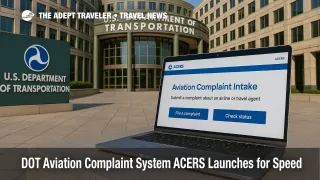DOT Aviation Complaint System ACERS Launches for Speed

The U.S. Department of Transportation has replaced its 1990s-era complaint workflow with the Aviation Complaint, Enforcement, and Reporting System, or ACERS. The update enables real-time routing of complaints to airlines and ticket agents, with automated email notifications and a modern consumer portal for filing. USDOT says the change should materially shorten the timeline from submission to review and response by industry and government. The agency also highlights improved data security and privacy protections for consumer records. ACERS went live the week of August 13, 2025.
Key Points
- Why it matters: Faster routing replaces month-long forwarding delays.
- Travel impact: Complaints, comments, and compliments reach airlines in real time.
- What's next: Agencies and carriers adapt workflows to ACERS portals and emails.
- Industry piece: Privacy impact assessment confirms the Salesforce-based modernization.
- Context: DOT refund rules already strengthened post-disruption remedies.
Snapshot
ACERS centralizes how aviation consumer complaints move between travelers, the Office of Aviation Consumer Protection, and industry. Under the legacy process, DOT analysts manually forwarded submissions, often adding a month before a carrier even saw a case. With ACERS, airlines and ticket agents receive new complaints instantly through the industry portal and by email, while the consumer portal streamlines filing. USDOT also flags stronger privacy and security around sensitive traveler data. The department expects the upgrade to improve throughput for the tens of thousands of complaints it handles annually.
Background
The Office of Aviation Consumer Protection uses complaints to spot trends, enforce consumer rules, and, when appropriate, open investigations. The ACERS modernization follows a multi-year effort, including a 2023 privacy impact assessment that describes a web-based, Salesforce-backed platform supporting intake, routing, and enforcement workflows. Federal notices in 2023 and 2024 previewed expanded data fields to capture more precise trip details, improving case quality and compliance reviews. For related rights after flight disruptions, see our explainer in Northeast Flight Delays Persist After July 31 Floods.
Latest Developments
Real-time delivery replaces month-long forwarding
USDOT's launch announcement states that when a complaint, comment, or compliment is submitted, the airline or ticket agent receives it immediately in the ACERS Aviation Industry Portal and by email. The department contrasts this with the prior process, where submissions could take more than a month to reach industry after manual handling. The agency also directs travelers to the ACERS consumer portal for filing and to its air consumer pages for rights education.
Status tracking and two-way messaging highlighted
Trade guidance around the rollout notes that the updated system allows flyers to track the status of their submission and communicate with airlines, ticket agents, and DOT analysts within the workflow. This capability aligns with DOT's broader emphasis on transparency and faster resolution, complementing recent consumer-protection rules.
Analysis
For travelers, ACERS should cut dead time between filing and first response, a frequent frustration when disputes linger without acknowledgment. Faster delivery to the right contact at an airline or ticket agent increases the chance that documentation, receipts, and timelines remain fresh, which can improve outcomes. The upgrade also dovetails with DOT's automatic refund rules adopted in late 2024, which set clear clocks for cash refunds after cancellations or significant changes, reducing the need for prolonged back-and-forth. A more responsive complaint pipeline and firmer refund standards together raise accountability across the ecosystem.
For industry, ACERS imposes more discipline. Real-time notices and a centralized portal shorten the window to triage, categorize, and respond, which may require staffing and process changes at agencies and carriers. On the back end, the privacy impact assessment confirms a modern, Salesforce-based architecture, suggesting better reporting and audit capability for regulators. While ACERS accelerates intake, it does not guarantee favorable decisions for travelers, and complex cases will still depend on evidence and regulatory standards. The likely near-term effect is faster first touch, clearer status, and better data for enforcement.
Final Thoughts
ACERS is a sensible modernization that should reduce friction, improve transparency, and get cases in front of decision-makers faster. If you cannot resolve a problem with an airline or ticket agent, file through the consumer portal, keep your documentation handy, and monitor status updates closely. Expect quicker acknowledgments, but remember that outcomes still hinge on the facts and rules. As agencies and carriers adapt, travelers should see steadier timelines and cleaner communications through the DOT aviation complaint system.
Sources
- USDOT Modernizes Aviation Consumer Complaint System, US Department of Transportation
- Aviation Complaint, Enforcement, and Reporting System, US Department of Transportation
- ACERS Privacy Impact Assessment, US Department of Transportation
- Air Travel Complaints: Complaint Process, US Department of Transportation
- File a Consumer Complaint, US Department of Transportation
- DOT upgrades filing system for airline complaints, Travel Weekly
